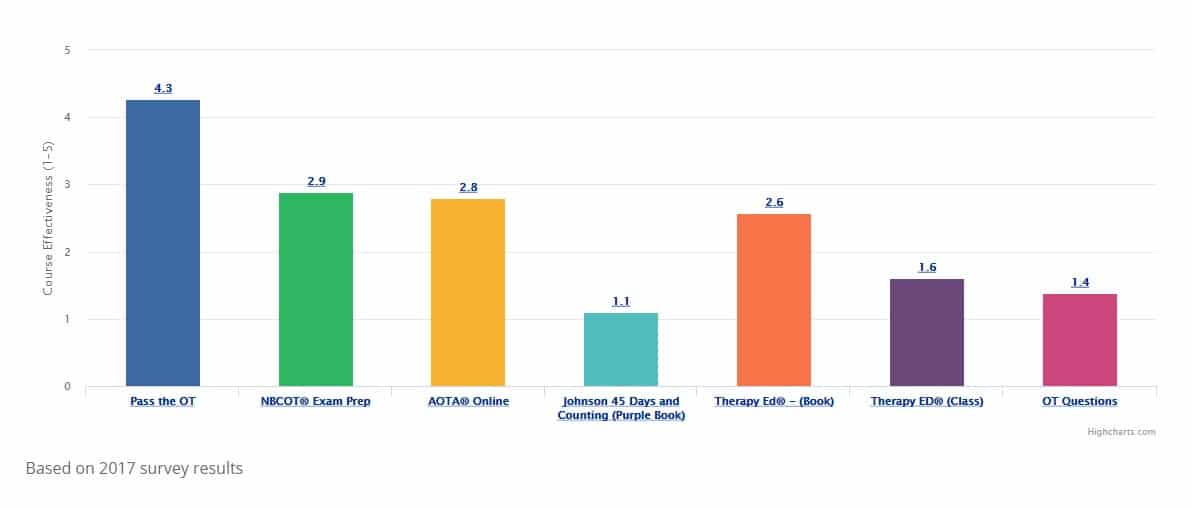Eight Week Study Schedule at a Glance
| Week | Topics | Study Material |
| One | Introduction to PTOT web course
1. OT process and Intervention |
• Welcome audio • How to use our course • Excellent Test Taking Tips • Getting Close to the Exam Date • Roles of an OTR®, COTA® and OT Aide • OT process and Intervention • Prevention Stages • Code of Ethics / Principles and Standards of Conduct • Frame of Reference • Bottom-vs-top-approach • CEU’s • OT Settings • The OT Practitioner’s Role in Work Programs • Documentation • Instrumental Activities of Daily Living (IADLs) • Patient-Driven Payment Model • Payment for OT Services • The Americans with Disabilities Act • Domains OTR®/COTA® • Research and Stats (OTs only) • Module 1 Audios and Videos • Take Module 1 Quizzes • Work with a Pass the OT Tutor |
| Two | 1. Pediatric Development 2. Pediatric Reflexes 3. Feeding 4. Pediatric Assessments 5. Pediatric Conditions and Interventions 6. Cerebral Palsy 7. Sensory Integration 8. Handwriting 9. IEP and other Laws |
• Development Chart • Childhood Occupations and Milestones • Basic Developmental Chart (newborn-18 months) • Mastering Functional Skills • Reflexes and Postural Reactions • Basic Oral Motor & Self-Feeding Skills • Feeding- Introduction to Solids • Strategies for the Fussy Eater • Pediatric Assessments • Pediatric Diagnoses and Treatment Approaches • Down Syndrome • Spina Bifida • Hearing Loss • Attention-Deficit/ Hyperactivity Disorder • Cerebral Palsy Interventions • Muscle Tone • Dysphagia- Focus on CP • Vestibular System vs Proprioception • Sensory Integration • Necessary Skills for Handwriting • Pencil Grasps for Handwriting • Individualized Education Programs • Part B IDEA: Process for Children and Youth (Ages 3-21) • Part C IDEA: Infants and Toddlers with Disabilities • Section-504-Rehabilitation-Act • NICU • Module 2 Audios and Videos • Take Module 2 Quizzes • Work with a Pass the OT tutor |
| Three | 1. Upper Extremities 2. Neuropathies 3. Splinting 4. Assessments 5. Physical agent modalities (PAM’S) 6. Chronic Heart Failure (CHF)/Met Levels 7. Chronic Obstructive Pulmonary Disease (COPD) |
• Muscle Chart Upper Extremities • Upper-extremity (Organized according to type of condition) • Hands & Upper Extremities • Grasp Patterns • Neuropathies • Splints • Strategies for splinting • Physical Agent Modalities (PAM’S) • Manual Muscle Testing Grading • Range-of-motion • Tests – Jebsen-Taylor Function & Semmes Weinstein Monofilament • MET Levels and Cardiac Rehab • COPD • FIM Quick Reference Guide • Vital Signs • Hemoglobin • Module 3 Audios and Videos • Take Module 3 Quizzes • Work with a Pass the OT Tutor |
| Four | 1. Spinal Cord Injury (SCI) 2. Traumatic brain injury and Rancho Levels 3. Neurobehavioral Manifestations & Neurological-treatment-approaches 4. Vision Interventions 5. Amputation and Prosthesis 6. Hip, knee, and back 7. Burns 8. Aging-in-place 9. Medical Conditions 10. Pressure Ulcer 11. Addressing Sexuality in Occupational Therapy |
• SCI Terminology & ASIA Impairment Scale • SCI Chart • Focus on High Level (SCI C1-3) • SCI Sequelae • Traumatic Brain Injury • The Glasgow Coma Scale • Rancho Los Amigos Cognitive Functioning • Neurobehavioral Manifestations • Neurological-treatment-approaches • Vision and Visual Perception • Amputation and Prosthesis • Hip, knee, and back • Burns • Pressure Ulcer • Medical Conditions • Addressing Sexuality in Occupational Therapy • Aging-in-place • Module 4 Audios and Videos • Take Module 4 Quizzes • Work with a Pass the OT Tutor |
| Five | 1. Neurodegenerative Disorders. 2. Motor control and approaches 3. Cerebrovascular Accident (CVA) 4. Apraxia 5. Parkinson’s Disease 6. Huntington’s Disease 7. Swallowing and Dysphagia 8. Driver’s Rehab 9. Vocational Rehab 10. Building Standards 11. Adaptive Equipment and Assistive Technology 12. Wheelchair Mobility |
• Neurodegenerative Disorders • Cerebrovascular Accident (CVA) • Parkinson’s Disease • Huntington’s Disease • Motor Control • Motor Control Approaches • Swallowing and Dysphagia • Apraxia Sheet • Wheelchair Components • Wheelchair Cushions • Assistive-technology for Wheelchair Users • Building Standards • Adaptive eating utensils accessories • Assistive technology • Mechanical Lift • Driver Rehabilitation • Work Evaluation and Interventions • Medical Terminology • Meal-Preparation Progression • Module 5 Audios and Videos • Take Module 5 Quizzes • Work with a Pass the OT Tutor |
| Six | 1. Psychosocial Conditions & Interventions 2. Symptoms and Challenges associated with Mental Health Diagnoses 3. Assessments used in Mental Health 4. Handling patients with difficult behavior 5. Psychiatric Medication 6. Stages of Group Development 7. Types of Groups 8. Group Dynamics 9. Dementia and Alzheimer’s disease & Reisberg scale 10. Allen’s Cognitive Level (ACL) 11. Reality Orientation and Validation Therapy |
• Mental Health Terminology • Mental Health Terms and Intervention Models • Mental Health Diagnoses • Symptoms and Challenges associated with Mental Health Diagnoses Part 1 • Symptoms and Challenges associated with Mental Health Diagnoses Part 2 • Psychosocial Assessments • Cognitive and Perceptual Assessments • Tips for handling patients • Common Side-effects of Psychiatric Medication • Dementia • Alzheimer’s disease and Reisberg scale • ACL Screen Assessment • Allen Cognitive Levels • Reality Orientation and Validation Therapy • 6 Types of Activity Groups • 5 Types of Developmental Groups • Group Dynamics- Facilitation and Leadership • 5 Stages of Group Development/Team Building • 4 Stages of Group Therapy • Module 6 Audios and Videos • Take Module 6 Quizzes • Work with a Pass the OT Tutor |
| Seven | Overall Review of Topics from previous weeks. | • Pass the OT 500 Flash Cards • Filter Quizzes by Category • Work with a Pass the OT Tutor |
| Eight | Overall Review of Topics from previous weeks. | Final Timed Exam
|




